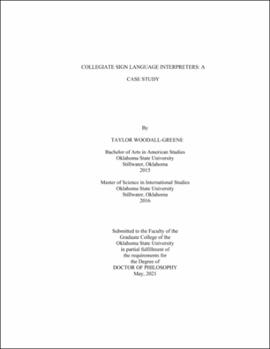| dc.contributor.advisor | Bailey, Lucy E. | |
| dc.contributor.author | Woodall-Greene, Taylor | |
| dc.date.accessioned | 2021-09-24T13:33:10Z | |
| dc.date.available | 2021-09-24T13:33:10Z | |
| dc.date.issued | 2021-05 | |
| dc.identifier.uri | https://hdl.handle.net/11244/330895 | |
| dc.description.abstract | Research about the sign language interpreting field has noted that burnout and attrition of interpreters is a serious issue of the profession. There is also a lack of research about interpreters who work in medical, legal, and educational fields. One gap is the unique work of higher education interpreters. The varied contexts, the complexity of the language, and diverse subject areas they must interpret make university interpreting challenging. Previous literature focusing on interpreters and burnout suggests individual traits of an interpreter or lack of support may cause turnover. There is a need for more research on interpreters' experiences in context. This qualitative case study focused on understanding and theorizing the experiences of 7 ASL interpreters who work at a dominant hearing public university. Methods included interviews, a focus group, and document and artifact analysis, including an arts-based collaging exercise. Data analysis included both inductive analysis and the Job Demands-Resources model as theoretical framework. Findings suggest an overall lack of awareness of interpreters' and D/deaf student's needs; structure and roles that shape their work; embodied demands; challenges in the diversity of student needs; stretched resources; and the sense of meaningful work that shape the case. There are broader structural and cultural components of the university which shapes interpreter's experiences. This study offers insights into interpreters' perceptions of their work and processes in one environment that can lead to burnout. It has varied implications for equity for D/deaf students, theorizing gendered professions that engage in care work, and the continued power of ableism in work and educational environments that necessitate redress. It amplifies knowledge for hearing students, staff, and faculty. | |
| dc.format | application/pdf | |
| dc.language | en_US | |
| dc.rights | Copyright is held by the author who has granted the Oklahoma State University Library the non-exclusive right to share this material in its institutional repository. Contact Digital Library Services at lib-dls@okstate.edu or 405-744-9161 for the permission policy on the use, reproduction or distribution of this material. | |
| dc.title | Collegiate sign language interpreters: A case study | |
| dc.contributor.committeeMember | Zhao, Guoping | |
| dc.contributor.committeeMember | Depperschmidt, Chad | |
| dc.contributor.committeeMember | Kinder, John | |
| osu.filename | WoodallGreene_okstate_0664D_17222.pdf | |
| osu.accesstype | Open Access | |
| dc.type.genre | Dissertation | |
| dc.type.material | Text | |
| dc.subject.keywords | asl | |
| dc.subject.keywords | deaf education | |
| dc.subject.keywords | gendered occupations | |
| dc.subject.keywords | higher education | |
| dc.subject.keywords | qualitative case study | |
| dc.subject.keywords | social foundations | |
| thesis.degree.discipline | Education | |
| thesis.degree.grantor | Oklahoma State University | |
